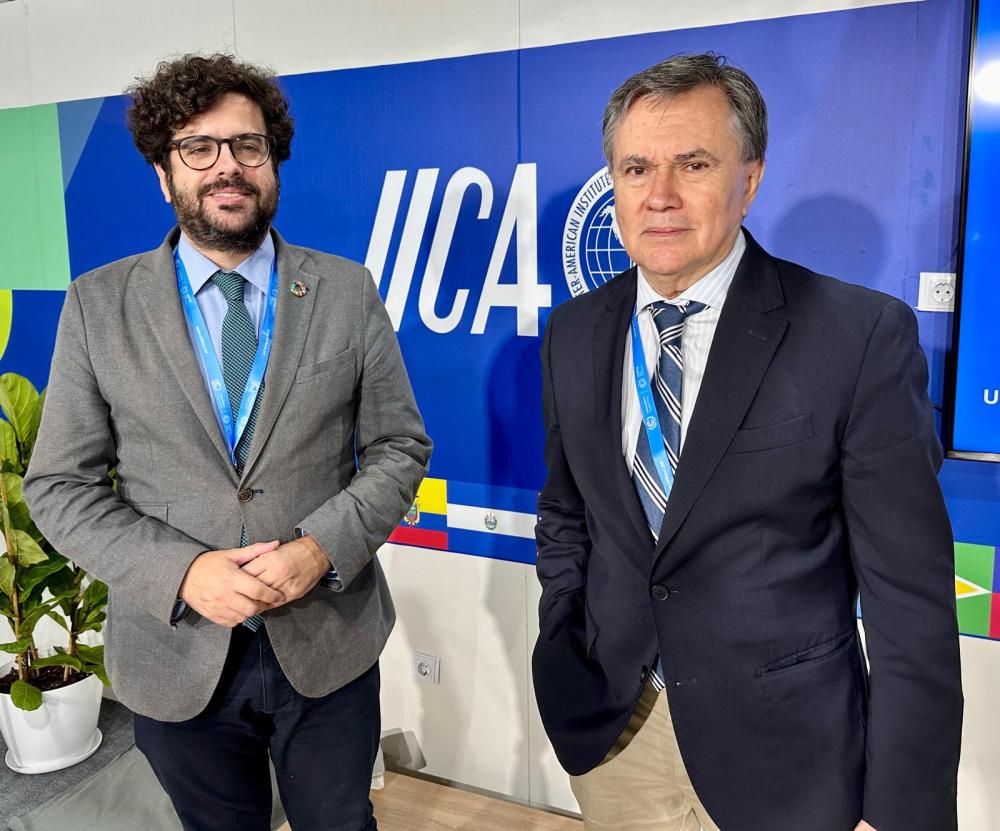The AECID and IICA have an ongoing, intensive program of joint activities. They are implementing a number of international cooperation projects, especially in countries such as El Salvador, Paraguay and Bolivia, in addition to regional projects in the Central American Dry Corridor, one of the most vulnerable areas in the world, in both social and climatic terms.

and Manuel Otero, Director General of IICA
BAKU, Azerbaijan, 12 November 2024 (IICA). New areas of common ground, including support for the transformation of agriculture in the Americas, access to technologies and innovations for small farmers, and the building of resilience in the agriculture sector in Latin America and the Caribbean.
This was the framework defined by the Director of the Spanish Agency for International Development Cooperation (AECID), Antón Leis García, and the Director General of the Inter-American Institute for Cooperation on Agriculture (IICA) with a view to stepping up the already extensive collaboration between the two agencies.
Leis García, his Chief of Staff, Victoria Tur Gómez, and the Head of the AECID’s Sectoral Cooperation Department, Miriam Ciscar, visited the Home of Sustainable Agriculture of the Americas pavilion, which IICA, together with its private sector partners and 34 Member States, have set up in Baku, Azerbaijan, where the annual Conference of the Parties (COP29), the annual summit of the United Nations Framework Convention on Climate Change (UNFCCC), is being held.
Otero was accompanied at the meeting by Kattia Fajardo, Manager of Agricultural Climate Action and Sustainability at IICA, and Federico Sancho, the organization’s Manager of Planning, Monitoring and Evaluation.
The presence of the pavilion at the most important global forum for environmental negotiations was made possible thanks to the joint efforts of the inter-American organization and its private and public sector partners. The collaborative, open-door space is designed to ensure that the 34 countries of the Americas and their farmers make their voices heard and showcase the major progress being made in their rural areas to contribute to climate change mitigation and build resilience to droughts, floods, and other natural events that are becoming more frequent and more extreme.
The AECID and IICA have an ongoing, intensive program of joint activities. They are implementing a number of international cooperation projects, especially in countries such as El Salvador, Paraguay and Bolivia, in addition to regional projects in the Central American Dry Corridor, one of the most vulnerable areas in the world, in both social and climatic terms.
The two institutions presently have a total of 12 specific joint actions.
Adaptation, innovative financing mechanisms, the decarbonization of crop and livestock farming, institution building, and the identification of future trends in the agricultural sector were some of the topics identified by García and Otero that will be incorporated into the AECID-IICA work program.
Otero gave Leis García details of IICA’s intensive institutional work program, while the Director of the AECID explained to the Director General how Spain’s cooperation agency plans to boost its activities.
The IICA pavilion at the COP will host more than 50 political and technical events, with an emphasis on science- and innovation-based solutions to the climate crisis in the agriculture sector, the only one that can sequester carbon in the soil and thus contribute to mitigation, while at the same time playing a vital role in food security.
More information:
Institutional Communication Division.
comunicacion.institucional@iica.int
